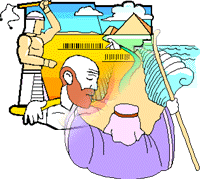As Is the Darkness, So Is the Light
The elevator opened immediately onto a vast living room. He had knocked three penthouse apartments together, the entire top floor. As the doors of the elevator opened there was a breathtaking view of Central Park.
There he was, the lord of the manor. Slowly, he rose from the sofa and walked to his dressing room. There were enough suits in there to service a gentleman's outfitter on Fifth Avenue. He walked right down to the end of the dressing room and stopped. Taking a long pole with a hook on its end he stretched out his arm and hooked the very last suit on the rail. He brought it closer to him. It was covered in a protective suit-bag. He unzipped the bag and withdrew the suit, or what was left of the suit. For to call it a suit would have been gross flattery. With a seriousness that bespoke some atavistic rite, he clothed himself in the ancient plaid jacket and pants and left the dressing room. He walked back to the living room and caught his reflection in the vast picture-window of Manhattan. He was the king of Manhattan. But he had not always been a king. As he gazed in the half mirror of the window, he remembered a young kid who grew up on the Lower East Side whose week was filled with more days than meals. It was a very long time ago. But every year on the anniversary of his first big sale, out would come the suit. He would put it on and sit for a while and remember every step up the ladder to the top of the tower.
If the sun never set at night, if we lived in a world that was perpetually day, not only would we have no word for "night," we would have no word for "day."
Man is a relative animal.
Our perceptions are finite and comparative. We understand light only to the extent that we have experienced darkness.
In the Haggada of Pesach, we start with a description of the baseness of the Jewish People. At the end of the Haggada we conclude with a list of attainments and blessings which G-d has bestowed on us. The Talmud debates whether the lowliness of the Jewish People in its beginning stage was a spiritual lowliness -- that we worshipped idols -- or whether it was a physical debasement, being slaves to Pharaoh in Egypt.
However, one thing is clear. The Haggada's underlying two elements are that we begin in the gutter and we end amongst the stars.
But are these really two elements?

Slavery and freedom are not two separate realities that we commemorate on Pesach. Rather the savoring of our freedom comes from the remembrance of our slavery. We can only appreciate light when we come from the dark.
That's a message that each of us can take from Pesach. In our lives, we walk at some time or other through a dark valley; a valley of death, a valley of depression, a valley of problems. We must know, that even though we cannot take the wisdom of happiness into the despair of depression, that G-d never puts us anywhere that we're not supposed to be. That He is always with us. Even when the lights seem to have gone out all over our lives, we must know that when the morning finally comes our eyes will barely be able to withstand the great radiance that has been prepared for us in the darkness.
A Happy Pesach!
- Source:
- Rabbi Noach Orloweck






